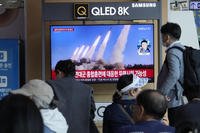The intelligence community and the Pentagon have pressed ahead, fought, stumbled and generally made a mess for more than half a decade of crafting a new guiding document for the NRO, the agency that builds and operates the nation's spy satellites.
The new document, known as the NRO charter, will mark the first major changes to the agency's guiding documents since 1965, four years after then-Defense Secretary Robert McNamara created the spy satellite builder and operator and drafted its charter. The new charter will be very short, perhaps a page or two, as was its predecessor.
Those one or two pages really do matter since the NRO is a bifurcated organization, drawing some of its employees from the Air Force and some of them from the CIA, so there is always the possibility of institutional friction that can affect the multi-billion dollars programs such as radar and electro-optical satellites that are the agency's hallmark.
“The charter is not just a piece of paper. It really has major, major consequences for how we are going to function,” Rep. John Kline said today. He stepped out front and did an interview with DoD Buzz on the NRO charter earlier today. For those who don't closely follow these issues, lawmakers don't say much in public about the NRO or related issues.
Once one of America's most closely guarded secrets and the unquestioned technology leader of the intelligence community, the NRO has suffered a series of bad technical falls and trips over the last decade. Under NRO Director Bruce Carlson things have begun to improve, congressional staff and intelligence insiders say. But lawmakers are getting really tired of the inability of the intelligence community and Pentagon to close the deal on a new charter, especially now that it looks as if no charter will be forthcoming until the end of this year after a big push to get it done before summer struck.
Last year's defense policy bill even included language requiring a new charter be submitted to Congress by Feb. 1. The Pentagon and the director of National Intelligence couldn't even get done a Statement of Principles meant to guide the final charter until March.
Rep. Kline knows the importance of NRO satellites and sensors, having served on the House Permanent Select Intelligence technical and tactical subcommittee and as personal military aide to Presidents Jimmy Carter and Ronald Reagan, when he carried the nuclear football, the case containing nuclear war plans and strike options. He now serves on the House Armed Services Committee, though he works closely with Rep. Mac Thornberry, ranking member of the HPSCI's technical and tactical subcommittee and a senior member of the HASC. The T and T subcommittee performs most House oversight of the NRO.
To get to the heart of the matter, I asked Kline what he would tell Defense Secretary Robert Gates and Jim Clapper, should he be confirmed as the new Director of National Intelligence: "I would tell them to tell their staff, that they want to have this document on their desks ready to sign by the end of the month."
Kline is clearly fed up with the inability of the military and intelligence communities to close on this. "It's been my concern all along that this whole issue of redoing the NRO charter has been hung up in what I think of as typical Pentagon bureaucracy. This has been going on for years," he said.
The NRO knows Congress cares about this. NRO Director Bruce Carlson briefed Kline and Thornberry "a few weeks ago" on the new charter's status. The good news -- the Statement of Principles was approved after months of having been hung up in the Pentagon's General Counsel's office, and Kline says it's a "very good basis for the charter." In addition, the final step before the charter, a Memorandum of Agreement between the Pentagon and IC, is in the final stages of coordination. It was supposed to be out by May. DoD Buzz was told by insiders that one phrase in the statement of principles appeared to be the problem: “overhead reconnaissance systems.”
The phrase at issue could be interpreted to include Air Force systems and thus give the spy agency powers it currently does not possess. That worries military space advocates. They believe it could allow the NRO to take budgetary and programmatic control over some systems currently controlled by the military services, especially the Air Force, only the latest symptom of the turf wars that Kline says continue to affect the organization.
In early December, Carlson said he was confident the statement of principles would be approved soon, clearing the way for the new charter’s approval. But to give you some idea of just how high the stakes are, one military space advocate said the delays suit him just fine. He just hopes “it goes on for a few more years.
Here is the language in last year’s defense authorization bill requiring a new NRO charter:
SEC. 1035. CHARTER FOR THE NATIONAL RECONNAISSANCE OFFICE.
Not later than February 1, 2010, the Director of National Intelligence and the Secretary of Defense shall jointly submit to the congressional defense committees, the Permanent Select Committee on Intelligence of the House of Representatives, and the Select Committee on Intelligence of the Senate a revised charter for the National
Reconnaissance Office (in this section referred to as the ‘‘NRO’’). The charter shall include the following:
(1) The organizational and governance structure of the NRO.
(2) The role of the NRO in the development and generation of requirements and acquisition.
(3) The scope of the capabilities of the NRO.
(4) The roles and responsibilities of the NRO and the relationship of the NRO to other organizations and agencies in the intelligence and defense communities.








